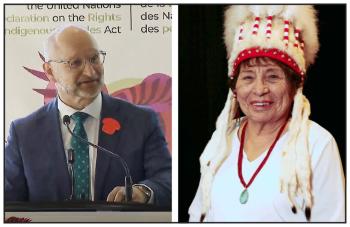Image Caption
Summary
Local Journalism Initiative Reporter
Windspeaker.com
Tsuut’ina Nation Councillor Regena Crowchild did not mark National Indigenous Peoples Day by celebrating the newly released United Nations Declaration Act Action Plan. She marked it in prayer in her southern Alberta community.
“While our peoples are celebrating their culture and their identity, Canada is announcing this thing about the national plan. Their national plan,” said Crowchild.
The national action plan announced June 21 supports implementation of Canada’s answer to the United Nations Declaration on the Rights of Indigenous Peoples (UNDRIP). The plan comes two years after the UN Declaration Act (UNDA) became law in Canada.
Assembly of First Nations (AFN) National Chief RoseAnne Archibald said that some First Nations did not support the action plan, and Tsuut’ina Nation counts itself among them.
Archibald, AFN British Columbia Regional Chief and UNDRIP portfolio holder Terry Teegee, as well as Metis National Council President Cassidy Caron and Inuit Tapiriit Kanatami President Natan Obed joined ministers David Lametti (Justice) and Marc Miller (Crown-Indigenous Relations) in Ottawa to launch the 2023-2028 national action plan.
“I want you to know that not 100 per cent of First Nations are in agreement with UNDA,” said Archibald. “Some are even in disagreement with the UNDRIP itself because it doesn’t honour the sovereignty of First Nations, that sovereignty that was required to enter into treaties.”
She added that the majority of First Nations had supported the process, though.
Lametti thanked the organizations for their “partnership and collaboration that has enabled us to arrive at this moment.”
But that’s the issue, says Crowchild. The government goes to organizations like the AFN, which is not a rights-holding institution. First Nations in Alberta have no regional chief with the AFN.
“We have international treaties with the Imperial Crown. At no time has Canada come to talk to our treaty peoples, the rights holders. We've never consented to what's on their national plan and on how they're going to implement it,” said Crowchild.
Tsuut’ina Nation was joined by 15 other Treaty Nations from Treaty 4, 6, 7, and 8 in denouncing the action plan and calling for Canada to engage directly with them.
“We've invited the Prime Minister (Justin Trudeau) and we've always told the ministers that they need to talk to us about any plans that are going to affect our treaty and our inherent and treaty rights and they have yet to do that,” said Crowchild.
Among the concerns voiced by the 16 nations in a June 21 statement is that the government plans to repeal the Indian Act, which “puts our land at risk and moves us into municipal structure of land governance—in violation of our Treaty.”
Crowchild says that repealing the Indian Act is necessary, but before that can happen there is “unfinished business about our treaties” that needs to be dealt with.
High on that list is land, which was never ceded or surrendered.
“How do we live sharing in certain parts of our territories and how do we live to coexist in harmony as intended under treaty?” said Crowchild.
Free, prior and informed consent is integral to that, especially around resource development, she says.
However, the action plan does not offer a framework for free, prior and informed consent when it comes to resource development.
Lametti said Natural Resources Minister Jonathan Wilkinson had committed to “the creation of a process that will help us better define the parameters of free, prior and informed consent.”
Lametti stressed that the action plan was a “living evergreen roadmap that will continue to evolve in consultation and cooperation and co-development with Indigenous peoples.”
The action plan consists of 181 measures led by 28 federal departments and agencies. Of those measures, 111 are considered “shared priorities” between the First Nations, Métis and Inuit. However, each group of Indigenous peoples has its own section with priorities specific to them.
Among the shared priorities is the establishment of an independent Indigenous rights mechanism or mechanisms (tools or processes), the co-development of an Indigenous climate leadership agenda, and the co-development of a distinctions-based economic reconciliation framework.
However, measures in the action plan still have to be prioritized and the action plan is missing both timeframes and dedicated dollars to implement the commitments.
There is also no process nor timelines offered for when federal departments are expected to bring their policies, regulations and laws in line with the United Nations Declaration.
The action plan, which has a five-year timeframe, does require annual progress reports which are to be developed in cooperation and consultation with Indigenous peoples.
Meanwhile, says Crowchild, treaty nations will gather July 1 at the Alberta legislature for a rally.
“Alberta is here because of our treaties. And they wouldn’t be here if we didn't enter into treaty with the Imperial Crown. So it affects both levels of government, but mainly at the federal government because they do things without our consent,” said Crowchild.
Local Journalism Initiative Reporters are supported by a financial contribution made by the Government of Canada.

